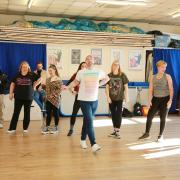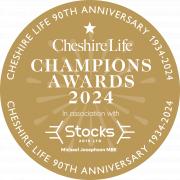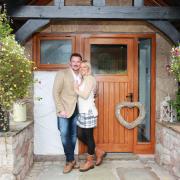We don our wellies to visit Grosvenor Farms, the multi-million pound farming business in Aldford owned by the Duke of Westminster
Click the picture on the right to start playing the audio
This recording is courtesy of Sandbach and District Talking Newspaper service
From a state-of-the-art digital studio in Sandbach, about 100 visually impaired listeners are served every week, but Sandbach TN is actively trying to increase the number of its listeners and also to reach others who perhaps suffer a disability which makes reading a strain.
For more information please look at the charity's website, www.talkingnews.org.uk, or call Pam on 01606 833408
Mark Roach knows he is lucky. For the past 12 years, since taking up his role as managing director of the Duke of Westminster’s farming business Grosvenor Farms, he has been a happy man. He enjoys views of the Peckforton Hills and Beeston from his office at Aldford Hall Farm at Aldford village, near Chester. He can spend his days out in the 6,000 acres of farmland of the Eaton Estate and the only nightmare commute he has to worry about is getting stuck behind a tractor.
‘I’m very fortunate,’ said the 50-year-old. ‘It was a great challenge and a privilege to take over and to come to somewhere where it’s such a good place to be. They are a great family to work for and it’s a great estate.'
'It’s probably one of the best jobs in the industry, I was pretty chuffed when I got the job.’
The Duke of Westminster must be glad to have a man like Mark at the helm because this is no small operation. There are 1,400 dairy cows kept at the handful of farms on the estate. The herd churns out 40,000 litres of milk a day and Grosvenor Farms is one of the biggest suppliers of milk to Tesco alone. They also farm around 2,000 acres of wheat, 500 acres of forage maize and 200 acres of wheat barley.
Add to this the several tenanted farmers, many from families who have farmed the land for generations, and you begin to understand the extent of this operation. While these farmers are not part of the Grosvenor Farms business, they are still an important part of the estate.
Over the years the Grosvenor Farms herd has won different awards including the prestigious Gold Cup in 2006. It is awarded by the Royal Association of British Dairy Farmers and is one of the industry’s most prestigious award.
‘This was a very proud moment for us,’ recalled Mark. ‘It was recognition for all of the hard work that goes on here. It was terrific and a tremendous achievement.’
But, for Mark, it is not just about the 40,000 litres a day the farm produces or the massive amounts of combined crops they harvest. It is about passing on the estate to future generations in a better condition than they found it when Grosvenor Farms was first set up in 1974.
The estate is also of huge environmental importance. The River Dee, which cuts through the estate and often floods, is an important part of the estate’s ecology as are the beautiful wildflower meadows and woodland and wildlife corridors that have been created at edge of many of the fields. The land is also home to many species of wildlife that set up home here.
The Duck Wood is home to the third largest heronry in the UK, some of the meadows and ponds are particularly good for butterflies, dragonflies and damselflies and a breeding lapwing sire on the estate’s larger wet meadows are considered the most important in west Cheshire.
He said: ‘It’s not just about farming, it’s about being stewards of the land and the environment around us. It’s about taking responsibility for the way we look after the land, the wildlife and it’s about acting in its best interests.
‘The farm is very rich in wildlife and there are some very important features on the land, we look after these as well. We are custodians of the farms, merely looking after them in the best possible way, ready for the next generations.’
He takes us on a trip around the estate and we stop in at one of the farms where the calves are reared. We meet Lesley Hughes, a calf rearer and one of only two women who work for Grosvenor Farms. She is the third generation of her family to work for the Eaton Estate.
She said: ‘My dad, Tony, worked here for something like 40 years, my grandfather was a gardener for the Westminster family and my nan was a cook up at the house on the estate. All the calves have different characters and you get to know each of them. I couldn’t imagine doing anything else.’
Lesley is one of the specialists who form the backbone of the business. All of the work on the estate is done by 35 core dedicated staff. It is the loyalty of these people which forms the foundations of the business. Mark said he believes that the Duke is happy with the way Grosvenor Farms is progressing and is looking forward to further improving things.
He said: ‘The family have been here since 1447 and they will be here for many more generations to come. Our time here, looking after the farms, is a tiny blip in a very long plan and we have to look at these in the long term. When I first came here we were farming on 18 different sites, now we farm seven larger sites and I think we have done well.
‘One day the Duke’s son will take on his father’s responsibilities and I’m sure we will be passing something onto him that he will be proud of.’
Grosvenor Farms: the facts and figures
When was Grosvenor Farms set up? The business was founded in 1974, a successor to Eaton Home Farm. It is a separate business in the boundaries of the Eaton Estate.
How many cows are kept on the farms? There are around 1,400 pedigree Holstein cows kept by Grosvenor Farms as well as 1,000 heifers
How much milk does the herd produce? Around 40,000 litres of milk are produced every day. They are also one of the biggest suppliers to Tesco. The cows are milked at 5am, 1pm and 9.30pm every day.
How much land is there on the Eaton Estate? Eaton Estate is about 11,500 acres, 6,000 of this is the farm land occupied by Grosvenor Farms.


























